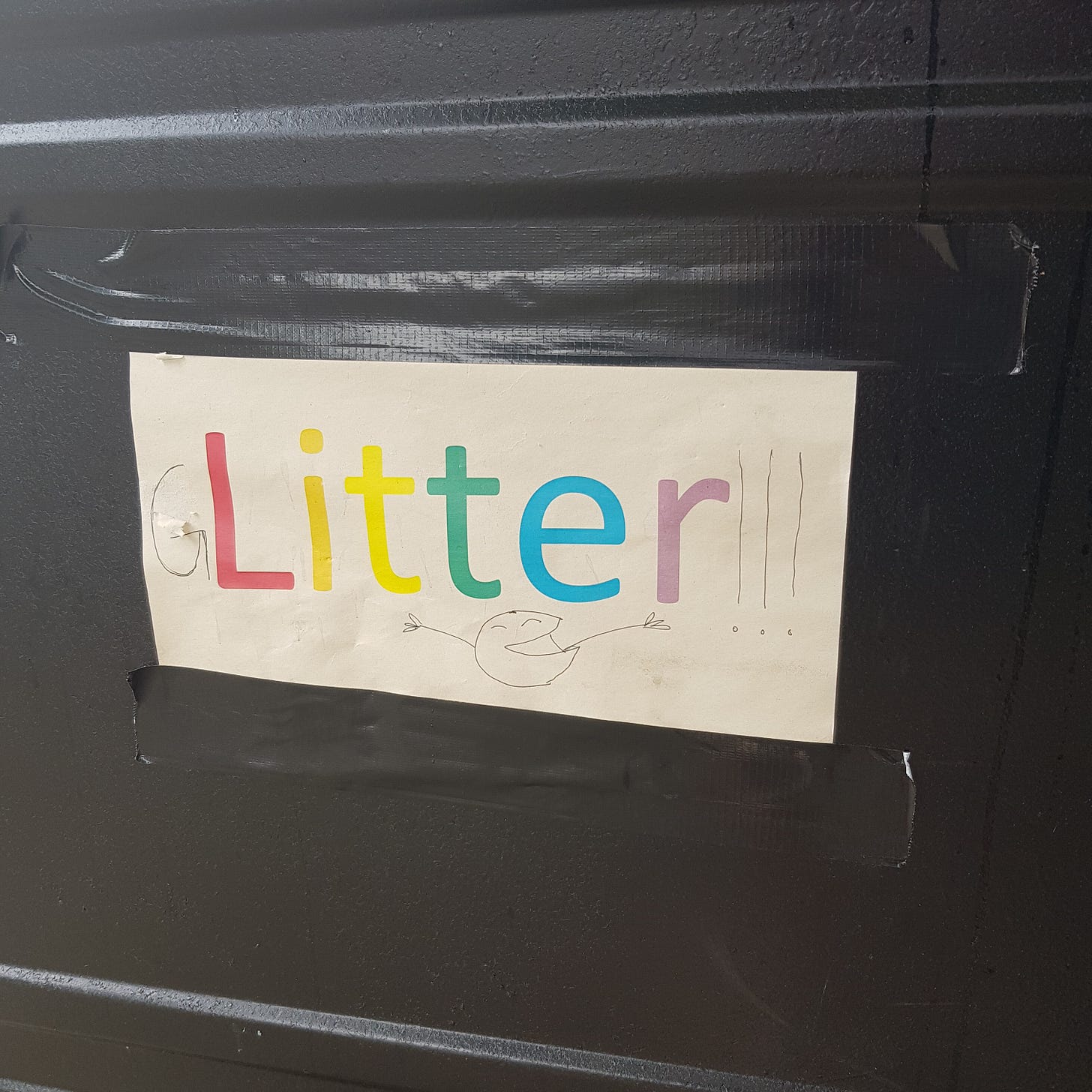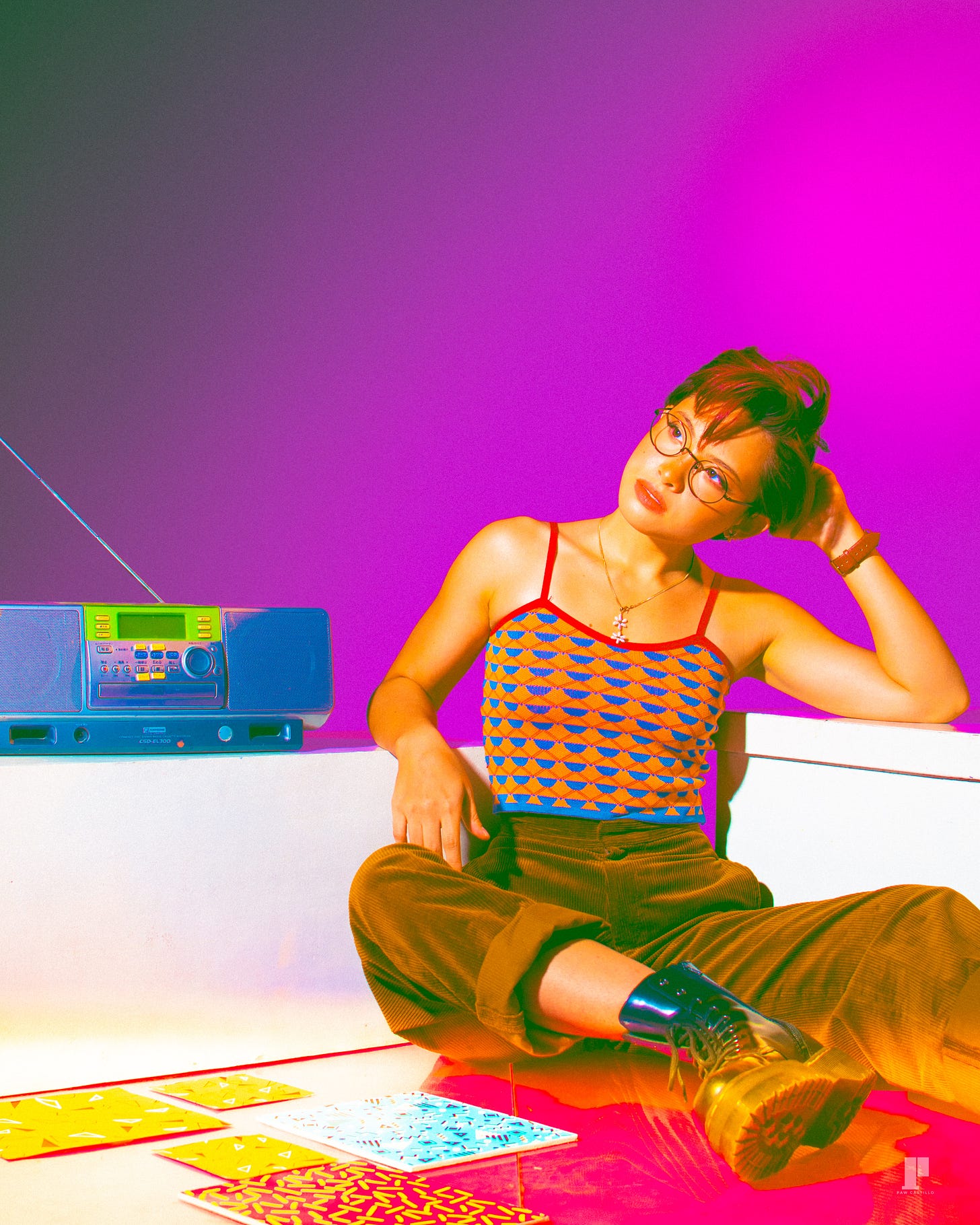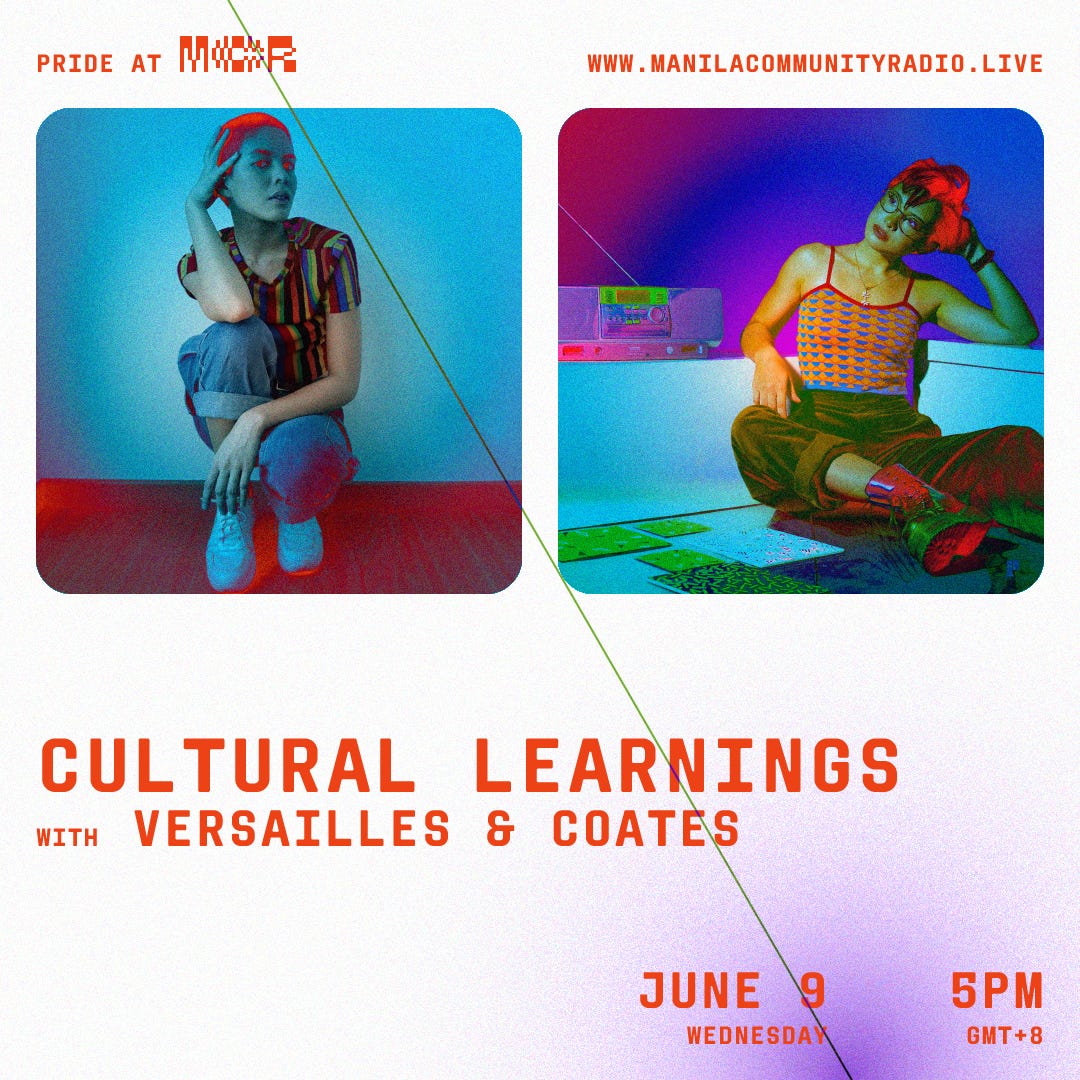Cultural Learnings is an editorial platform for discussions on contemporary culture, curated by Sai Villafuerte. You can support it by subscribing to this newsletter, sharing it with your friends, emailing your thoughts, or answering this survey. Cultural Learnings is on Manila Community Radio every Wednesday, 17:00 - 18:00 GMT+8. You can access the radio archive here.
Shot during Brighton Pride, 2019. “When you’re gay, but also trash.”
This month, Cultural Learnings is spotlighting the LGBTQ+ community, inviting guests to platform their creativity and participate in important cultural conversations.
Talking about queerness is never easy. For cis-gendered straight people, it can feel like walking on eggshells, even when done with the best of intentions.
However, it should be stressed that simply not fumbling on your own words doesn’t equate to the struggle queer people face where saying the “wrong” thing leads to stereotypes or even the cost of life. Your friend is not your “gay best friend” – they are, like you, a three-dimensional human being with pain and aspirations.
Pride Month is important because it gives dignity to people fighting for their right to exist without threat. It also provides an opportunity to reflect on something about human nature: that everyone has their own unique experiences of discrimination. Hence, any understanding we conclude to must be intersectional. Queer representation that solely reflects the white, middle-class, and able-bodied would be failing to achieve the equality society at-large so often desires.
These are just some of the topics Rachel Coates and I touched on one hot Saturday afternoon. During her lunch break, she met with me at a café in front of the vintage clothing shop she works in. As an actress, she recently starred in Pearl Next Door, a Filipino web series about a girl caught in the throes of love between her best friend and a friend from childhood – a narrative with extraordinarily little visibility in the Philippines. Rachel also makes music, taking cues from Grace Jones, David Bowie, and Fleetwood Mac.
Tomorrow (Wednesday), Rachel is taking over my weekly slot on Manila Community Radio with her musical radio play, “JOAN HIJACKS THE STATION.” Synopsis: Christmas Day, 1989. Your aunt's weird roommate has invaded the local airwaves with a very queer mixtape.
It’s a very special show, so please tune in!
How are you, Rachel? What have you been up to?
The energy recently has been receptive. I’m trying to [expend] as little as possible while taking in as much as possible. I've been listening to a lot of music and watching films I've missed out in the past couple of years.
What films have you seen recently?
I saw Desert Hearts! Oh my go—That shit is crazy. The aesthetics, the script; the performances, the love scenes … I've been trying to watch more queer films since I finished Pearl Next Door. Suddenly, people are like, “Hey, talk to us about queer representation.” I'm like, I don't really know! I was home schooled until high school. I wasn't exposed to that stuff until college.
Why do you think it's still difficult to find positive queer representation in cinema?
So much of it was underground, which makes it even harder to find. Much of the positive representation [in cinema] came from the queer community and it’s very difficult to find a Hollywood film with positive gay representation. Some adult films even represented us better.
What do you think is missing in Hollywood films in terms of queer representation?
Having the subjects be the producers. So many Hollywood films are directed by straight white men. White women would be lesbians on screen, but you can tell they've never spoken to a white lesbian before.
Let’s talk about what you do on a day-to-day. How has the pandemic affected you creatively?
I’ve taken up cycling again. Mostly, I’m in my inner ear monitors, blasting eighties music. I suppose that’s changed how much input I have. I have a lot of it now because I'm always on my bike. Discovering creative things has become an internal experience. Before, so much of it was shared: I listen to music in the company of friends or I’d play music I think they'd like. Now, it's completely introspective. You can listen to Bulgarian throat singing and enjoy it by yourself!
What is your queer identity and what does it mean to you?
I identify as a lesbian. But to be completely honest, I sometimes find the labels limiting. I say I'm a lesbian because I'm seeking women and I want a loving relationship with a woman someday. But I can kiss a guy, it doesn't matter! I'm trying not to see the label and just accept whatever comes to me. At the same time, when you use ever-changing labels to define humans, that’s … eugh! Sketchy.
How does this view on your identity impact your creativity?
When I released music that didn’t change the pronouns, people hold on to that. You become a queer musician in the same way Christian musicians are Christian. It slots you into that thing. Since I came out, I haven't had any acting auditions or casting calls for characters that weren’t necessarily queer.
How do you overcome being pigeonholed like that?
I've been making sure that everything I do comes from a place of authenticity. There are some songs in the mix where the pronoun is a "him" is because it is about a him. I just let it be how it is. Hopefully, people like me because I’m true and real.
So, what is authenticity?
My definition of authenticity ties into the reason why I love the eighties so much. You could argue the flamboyance of the eighties isn't authentic because no way David Bowie was chillin' in his house looking like that. But to me, that’s authenticity because in being so out there, you are being vulnerable. People see that. I suppose authenticity is the most distilled version of the self.
What do you think is the most misunderstood thing about the LGBTQ+ community?
I think the most misunderstood thing about us it that we’ve only just gained visibility. The narrative I’m seeing these days is that everyone is a little gay and that sexual orientation is a trend. Sure, counterculture has become trendy, but we’ve always been around – maybe a little deeper within the folds of culture and not quite on the surface.
So, it’s about time we became less of an open secret and more flamboyant. That’s what Pride means to me. Being “loud and proud” is an incredible privilege, but it shows how powerful flamboyance can be in influencing culture.
You can follow Rachel on Instagram, Twitter, and Spotify.
Rachel recommends three Cultural Learnings of her own: Watch Desert Hearts, listen to anything by Wendy & Lisa, and join your local cycling club.
A book on the “politics of bad sex” by Katherine Angel suggests that “mixed feelings are at the heart of desire and pleasure.” Here’s a review from The New Yorker.
Little White Lies published this fantastic queer analysis of the television show Succession.
I found this in a Facebook post and it blew my mind:
In Nazi concentration camps, each prisoner was required to wear a downward-pointing, equilateral triangular cloth badge on their chest, the color of which identified the reason for their imprisonment; A pink triangle was established for prisoners identified as homosexual men, which also included bisexual men and transgender women. The pink triangles were slightly larger than the other colored triangles so that guards could identify them from a distance. It is said that those who wore the pink triangles were singled out by the guards, and when the guards were finished with them, some of the other inmates would harm them as well. At the end of the war, when the concentration camps were finally liberated, virtually all of the prisoners were released except those who wore the pink triangle. Those with a pink triangle on their pocket were put back in prison and their nightmare continued. Prisoners imprisoned for homosexuality were re-incarcerated by the Allied-established Federal Republic of Germany. The Nazi amendments to Paragraph 175, which turned homosexuality from a minor offense into a felony, remained intact in East Germany until 1968 and in West Germany until 1969, though West Germany continued to imprison those identified as homosexual until 1994. 1994, only 26 years ago. The holocaust did not end for everyone in 1945.
Here’s seven-year-old Selena Gomez singing Britney Spears’ “Don't Go Knocking On My Door”, circa 1999/2000.
Corrections: Rachel’s musical radio play is called “JOAN HIJACKS THE STATION,” not “JOAN HIJACKS THE AIRWAVES.”











